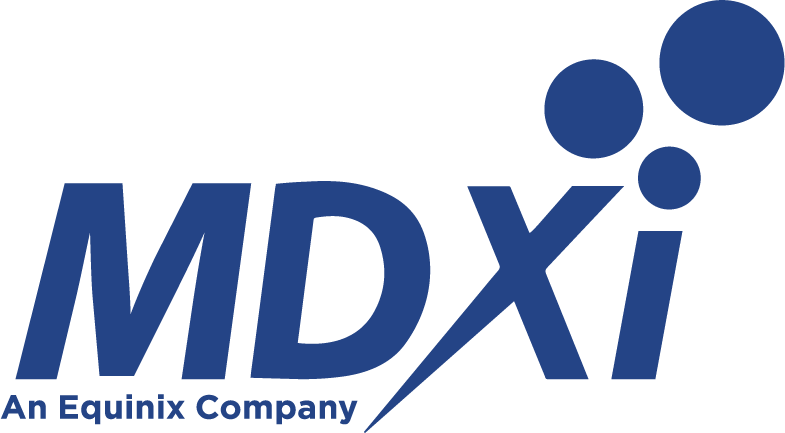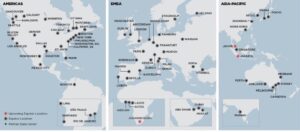In recent years, West Africa has emerged as one of the world’s biggest digital success stories. For instance, Nigeria met a key digital maturity milestone in 2020, when the Internet Society confirmed that about 70% of the country’s traffic was exchanged locally rather than in data centers abroad.[1] This is up from only about 30% in 2012, a clear sign of the rapid growth of internet exchange points and ecosystem density in the country. This growth has helped local businesses deploy the latest digital technologies while also making the region a more attractive expansion target for global enterprises.
The growth of digital infrastructure in West Africa has received a boost from investments from major global technology companies. For instance, Google backed the Equiano cable system, which the company anticipates will create a 20x increase in upstream capacity entering Nigeria. In turn, this will increase typical internet speeds in the country six-fold.[2]
We at MainOne are certainly proud of the role we’ve played in growing digital infrastructure in West Africa, but I believe we all must keep building on that success to help the region reach its true potential. The challenges we still need to overcome in West Africa include ensuring effective middle-mile and last-mile network infrastructure. Sub-Saharan Africa also has some of the least affordable connected devices of any region, relative to average income levels. This will need to change before West Africa can become a true digital powerhouse.
Overcoming these challenges will require local companies and multinationals working together toward the same goals. Businesses in West Africa need both robust digital infrastructure within the region and access to services and ecosystem partners on a global scale. Now that MainOne is an Equinix company, this is exactly what we can offer our customers.
We’re now able to bring together the global reach of Equinix with the MainOne infrastructure portfolio—including data centers in Lagos, Accra and Abidjan; a subsea cable system with service delivery across 10 West African countries; and the region’s largest digital ecosystem. We look forward to continuing to help West African businesses keep up with the rapid pace of innovation and set themselves up to thrive in the digital economy of the future.
West African businesses are leaders in AI and other digital innovations
Despite the challenges on the horizon, IT leaders in West Africa have already shown themselves to be among the most innovative in the world. The results of the Equinix 2023 Global Tech Trends Survey (GTTS) demonstrate this fact. For example, Nigerian IT leaders were significantly above the global average when it comes to AI adoption. In the survey, 93% of Nigerian respondents said they’re prioritizing AI broadly across their IT strategies, compared to a global average of only 73%. They were also less likely to say they were uncomfortable with their ability to accommodate the growing use of AI, both in terms of their infrastructure and their workforce.
Despite this, Nigerian IT leaders did have some unique concerns that could deter them from adopting newer technologies. For instance, 42% of Nigerian IT leaders said that slow implementation would be an issue for them, compared to 37% globally. This may indicate that increased availability of virtual infrastructure solutions that can help speed up implementation would be especially welcome in West Africa.
Nigerian businesses were also much more likely to use digital twins across a variety of different use cases, particularly compared to their counterparts in the rest of the EMEA region. While 63% of Nigerian respondents said they’ve used digital twins to drive improved customer satisfaction, only 39% of those across EMEA said the same. This could suggest that some of the challenges of doing digital twins in Europe, such as accessing the necessary data while also complying with strict privacy and sovereignty regulations, may not be as big of a concern in West Africa.
How are West African businesses preparing for the future?
Digital expansion
Over the short term, Nigerian digital businesses see their expansion opportunities closer to home. In the GTTS, 45% of Nigerian IT leaders said they planned to expand to a new city within the country in the next 12 months, compared to only 32% globally. In contrast, these Nigerian leaders were slightly less likely to say they planned to expand across borders.
Hiring for IT skills
To help them execute their planned digital expansions, about two-thirds of Nigerian IT leaders said they would hire dedicated staff in the new area—again, significantly above the global average. Indeed, there are clear signs that businesses intend to ramp up IT hiring throughout the region. IT leaders in Nigeria were twice as likely as their global counterparts to say they planned to grow their teams quickly (increasing headcount by 25% or more) within the next 12 months.
As they look to find the right mix of talent to power their digital success, Nigerian businesses will face many of the same challenges as those in other parts of the world, including keeping up with the rapid pace of change in the tech industry. However, there were some issues that seem to be uniquely challenging in the region. For instance, Nigerian IT leaders were significantly more likely to name geopolitical challenges among the biggest skills challenges facing the tech sector.
Environmental and social sustainability
There’s evidence that digital businesses in the region will face new complexity around sustainability going forward. When asked to name the challenges they face around new and upcoming environmental regulations, more than half of Nigerian IT leaders said that there are too many regulations to comply with, and that the regulations are changing too quickly. This places Nigerian businesses significantly above the global average on both points.
Finally, Nigerian IT leaders offered a unique perspective when it comes to closing the digital divide. When asked to name specific technologies that could help close the digital divide quicker, almost three-quarters named 5G. This could be a sign of the lingering excitement following the launch of the first 5G networks in Nigeria last year.
In contrast, Nigerian IT leaders were much less likely than their global counterparts to name terrestrial fiber as a potential solution to the digital divide. Given the limited penetration of fiber in West Africa today, it’s not surprising that most IT leaders in the region see expanding mobile networks as the greater opportunity going forward.
Equinix is dedicated to helping digital businesses in West Africa overcome challenges and capitalize on opportunities
As we plan for the future of digital infrastructure in Africa, Equinix is committed to playing our part. Through the acquisition of MainOne and other major investments, Equinix aims to become Africa’s digital infrastructure company, just as we are the world’s digital infrastructure company®.
Equinix has already invested $350 million in Africa. Going forward, we’ll continue to invest in all aspects of digital connectivity in West Africa, from providing landing sites for major subsea cable projects, to increasing network density, to expanding our product portfolio, to deploying data centers and network infrastructure at the local level.
Earlier this year, we launched the extended Equinix Fabric® in West Africa to provide customers with an early experience in connecting with partners and customers around the world, spanning 249+ data centers across 71+ global metros and 32 countries. We’re also working toward making Equinix Fabric locally available in West Africa in the coming years. This will make it quick and easy for our customers to connect from West African metros to major markets around the world in an automated way. It will also enhance connections to African cities from Europe, the Americas and Asia.
We’ve announced an additional $390 million in new African investments over the next five years. This includes a new interconnection hub in Lagos, Nigeria and our expansion into South Africa, where we plan to open our new Equinix IBX® data center in Johannesburg in mid-2024.
To learn more about how the rapidly growing digital economy is shaping demand for digital infrastructure—in Africa and throughout the world—read the Leaders Guide to Digital Infrastructure today.

